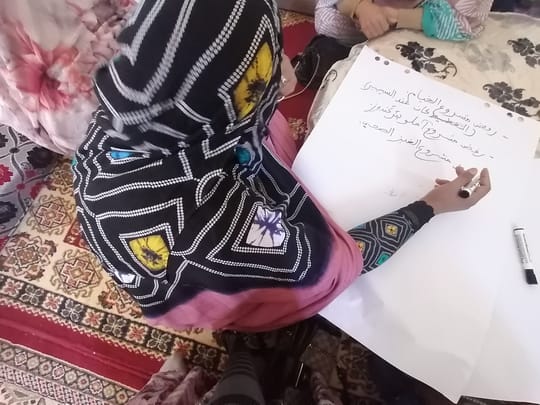Cheikh Akmach
HAF Site Coordinator, Dakhla-Oued Ed-Dahab region
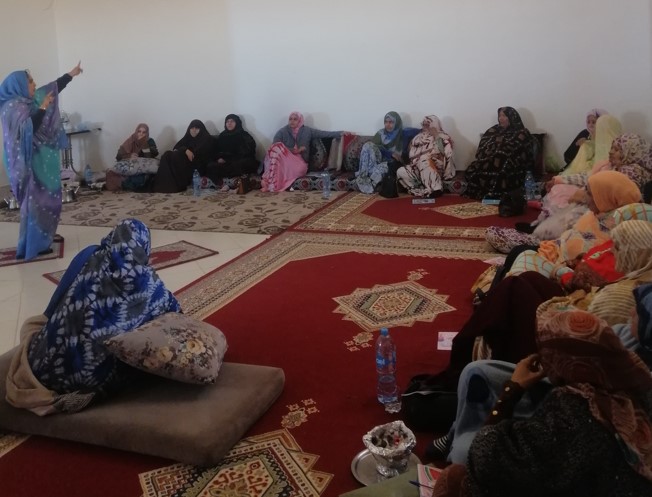
February the 16th marks the start of the training series provided by the High Atlas Foundation (HAF) with nomadic people in the Bir Anzarane municipality of the Dakhla-Oued Ed-Dahab region. We began the four-day Imagine women’s empowerment workshop.
The training is part of a Middle East Partnership Initiative (MEPI) program for participatory planning and the implementation of community initiatives. The goal is to train 150 individuals from three municipalities in essential skills such as entrepreneurship, digital marketing, advocacy, and finance three local initiatives that address current challenges.
Due to the harsh conditions of the desert, the participants and HAF team decided to organize the event in Bir Gandouz, where members of the nomadic community have relatives and purchase supplies and necessities. As is the case with every Imagine Workshop, Hana Ezaoui and Hajiba Boumasmar welcomed the 18 participants with open arms.
Hana and Hajiba, equipped with their great experience, spoke about the seven core areas of the workshop: emotions, relationships, body, sexuality, work, money and spirituality. Each area was given its own fair share of time to be discussed.
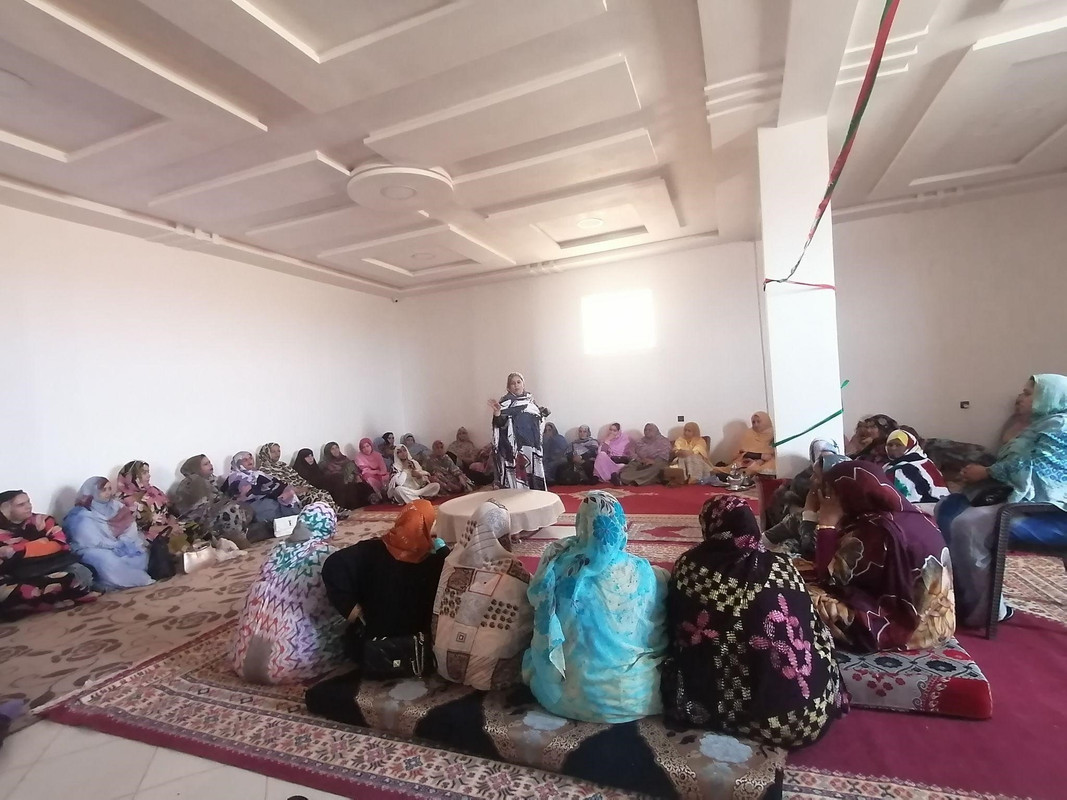
Hana explains the core elements of the workshop (credit: Hajiba Boumasmar/HAF).
The topics were personal, sensitive and rarely brought up in the nomads’ day-to-day lives. The harsh living conditions to which they are subjected leaves no room for thoughts of emotion or self expression. For the participants, this workshop was a window to exploring the view that encourages empowerment, self-confidence, and self-expression for women.
For our trainers, this was an unusual group. The nomads are people who live in the 21st century, yet are unswayed by its distractions and comfortable lifestyle. The nomads are people who choose to live following the ways of their ancestors. They choose to defend their cultural heritage and to keep passing it down to future generations.
Hana and Hajiba were grateful when they saw the extreme attachment of the nomad communities to their way of living. One of the participants said that she could not bear to part with the desert for a period longer than a month. Living in a city makes her feel suffocated, imprisoned within four concrete walls. Physically and mentally, living in a city makes her feel constrained, isolated, and under stress.
Meanwhile, living in the desert brings her freedom. She could stretch her sight thousands of meters away with no limitations blocking her gaze. As she walks through the desert —she narrates— she could feel the spirits of her ancestors who walked there before. She could feel the spirits of her descendants in the not so far future walking by as well.
For the nomadic women, the desert is not merely somewhere to live physically, it is also their spiritual center. Its vastness, silence, and majesty gives them comfort, calmness and mental fortitude.
City dwellers such as I might only see the surface of this lifestyle. We see the rough conditions, the hard work, and the harsh weather. We lament the lack of electricity and internet connection, but is the city environment humane?
The deep love the nomadic people have for the desert is not something that can be explained in a sentence or two. The trainers were astonished at the depth of that love and attachment. And as the workshop progressed, Hajiba and Hana began to facilitate the conversation around the current issues the nomadic community faces.
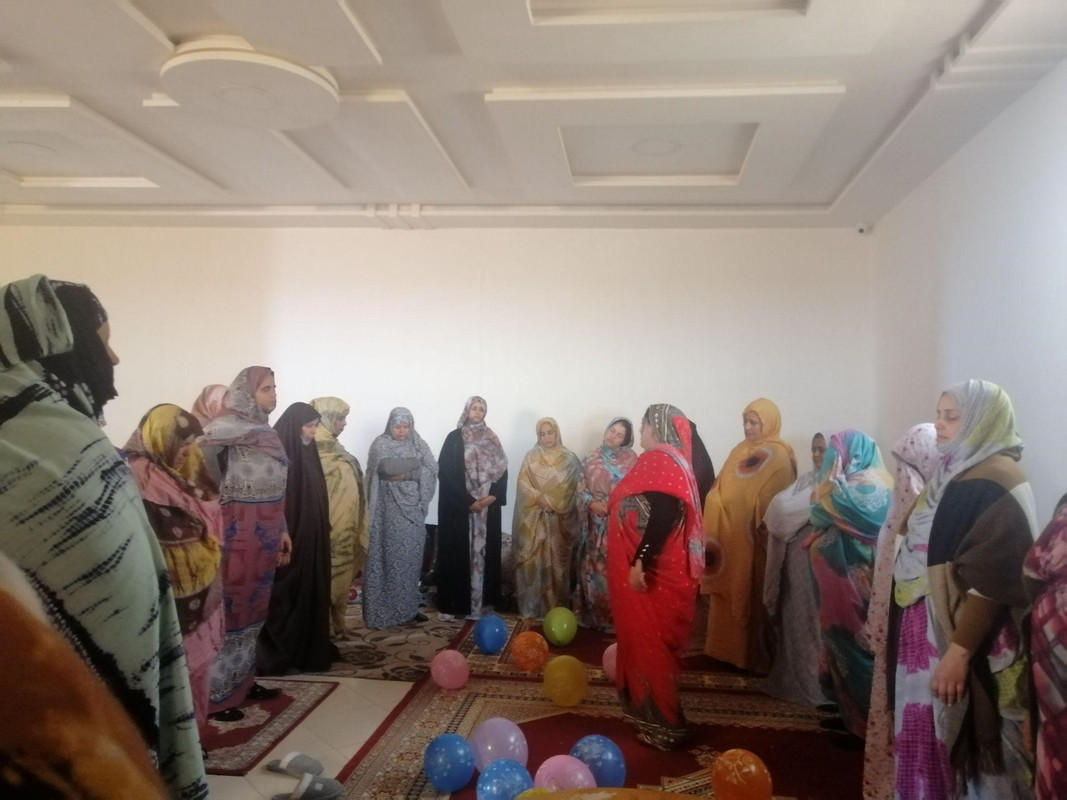
Participants in a deep meditation practice on the 3rd day of the workshop (credit: Hajiba Boumasmar/HAF)
This initiative was met with great appreciation. Together, the trainers and the nomadic participants started brainstorming to identify and tackle these challenges.
The first challenge that our participants shed light on was the lack of water. This problem poses a very serious threat to the community. Many of the old wells have dried up. And due to various factors (including climate change) the region faced several years of drought which led to the death of many of the nomads’ camel and sheep herds.
We must remember that a nomadic person’s herd of camels is his lifeline. It is his capital. So when they start to die en masse, it is a horrific catastrophe—similar to when the stock market falls and people’s savings and investments are negatively affected.
The participants proposed to expand and rebuild some old wells, to make some technical modifications, to add in solar energy to make the process more energy efficient and environmentally-friendly.
The women explained that their need for water is not about luxury; they—the nomadic people—are the most self-conscious people about the usage of this vital resource. Their entire lifestyle is based on traveling through the desert to find new sources of water.
The nomadic women told us that they want to preserve their Hassani cultural heritage. But the environmental challenges they face with the expansion of big farms that drain the groundwater reserves endanger their way of life. This leaves them with no choice but to seek external help and thus comes the role of HAF as a civil organization that specializes in preserving culture in a manner that also integrates sustainable development efforts.
The second project the nomadic women identified was related to the medical herbs found within the desert. The Sahara is a wondrous place with its own lifeforms. There are many herbs that have medicinal properties that helped our Sahrawi ancestors to survive and heal from various injuries and illnesses.
The nomadic women proposed the creation of a cooperative that specializes in collecting, sorting, packaging, marketing, and selling these herbs as a source of income for these families. This would be a helpful contribution to the entire municipality, who are unable to collect these herbs by themselves.
Finally, the workshop came to closure after four days. The nomadic women’s faces shown with splendor as the candles were lit signifying their hopes for a better future. Their eyes gleamed with a new understanding of life. The women felt empowered and in control of their lives more than ever before.
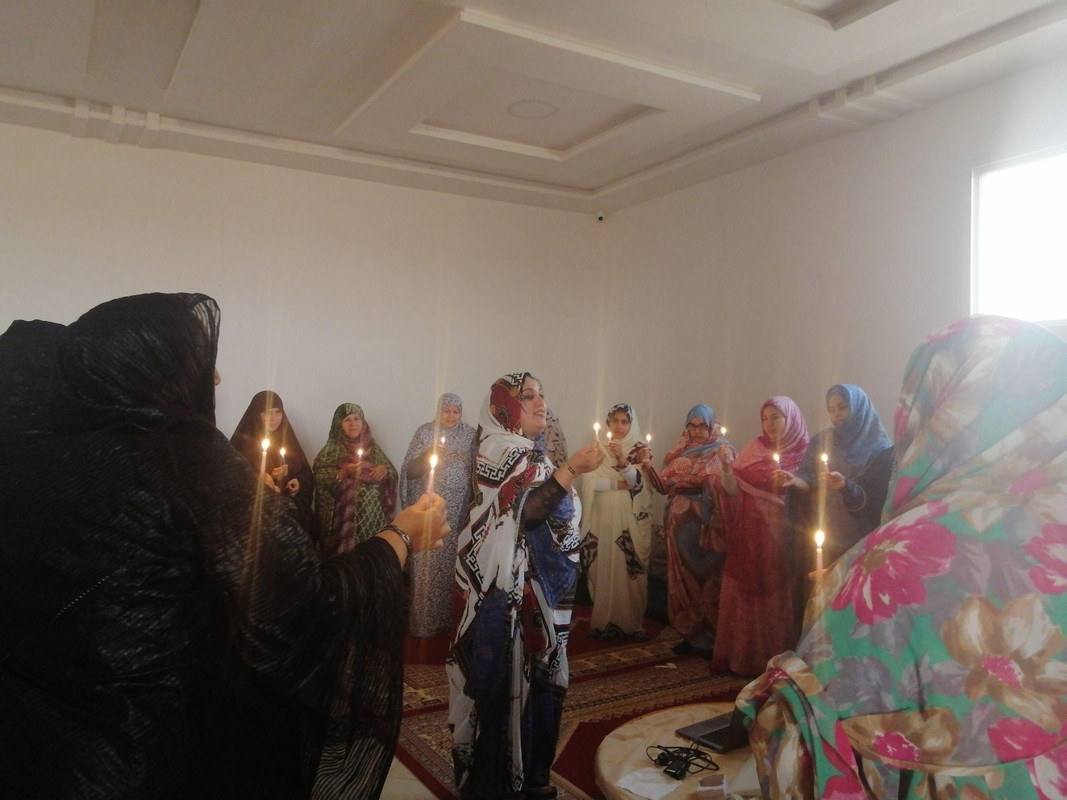
Nomadic women lighting candles of hope, empowerment, and self-expression (credit: Hajiba Boumasmar/HAF).
Our trainers gave the promise of another meeting. A meeting where new discussions will arise, where project ideas will slowly solidify and take shape. The women expressed their readiness to participate in future events.
And thus the curtains were closed for this event. But while this workshop has come to an end, HAF continues to conduct training with women in the Dakhla-Oued Ed-Dahab Region on building skills such as digital marketing, advocacy, and participatory governance as part of the MEPI program.
If you feel that such programs need to be supported, I would like you to help us spread the word by sharing this article with your friends and family to bring the truth to light or maybe you could prove your generosity by donating to HAF, the foundation that planted more than 4 million trees in Morocco. We do this together to create a more habitable environment for us all.
